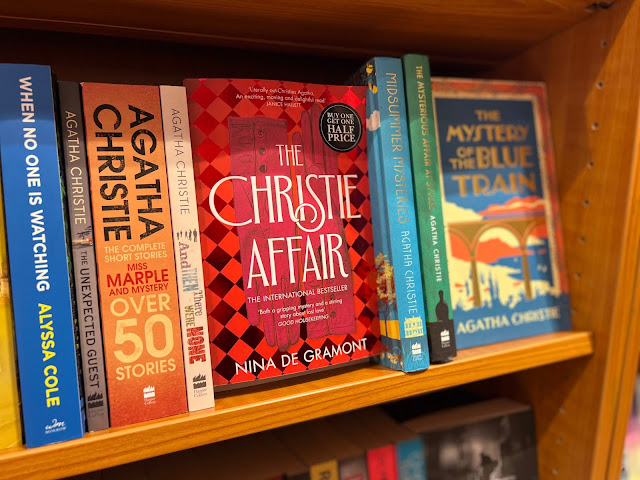"Her whole life, Agatha refused to answer any questions about the eleven days she went missing, and it wasn't only because she needed to protect herself".
"For years I'd been swept in directions I never meant to go. I'd made mistakes, acting by accident or imperative. Finally, in this moment, I was the author of my story".
Every couple of years there is yet another fictionalised account of Agatha Christie's disappearance in December 1926. The real life mystery has never been solved. Dame Agatha who died in 1976, never uttered a word about it.
The Christie Affair by Nina de Gramont is a psychological mystery novel set in 1926. It comes up with a totally unverified version of what might have happened, when Agatha went missing. It's definitely inventive, but is not supported by any real data.
Blurb:
In 1926, Agatha Christie disappeared for 11 days. Only I know the truth of her disappearance.
I'm no Hercule Poirot.
I'm her husband's mistress.
Agatha Christie's world is one of glamorous society parties, country house weekends, and growing literary fame.
Nan O'Dea's world is something very different. Her attempts to escape a tough London upbringing during the Great War led to a life in Ireland marred by a hidden tragedy. After fighting her way back to England, she's set her sights on Agatha. Because Agatha Christie has something Nan wants. And it's not just her husband.
Despite their differences, the two women will become the most unlikely of allies. And during the mysterious eleven days that Agatha goes missing, they will unravel a dark secret that only Nan holds the key to.
The premises of the story of what might have happened, when Agatha Christie went missing for eleven days was promising.
The story is told in the first person narrative by Nan O'Dea, the mistress of Agatha Christie's husband Archie. In real life she was called Nancy Neele.
The Other Woman is too intelligent and perceptive in the novel. Her sympathy towards Agatha is so insincere. Her re-imagining of what Agatha might have felt is bordering on stalkerish-obsessive, while in real life she was most likely just an unscrupulous opportunist who enjoyed the thrill of sleeping with the married man, "just because she can".
Nan is quite patronising, convincing herself that she almost does a favour to the woman whose husband she covets. "And I decided - the way someone who's doing something cruel can decide - it's all to the good: she deserves better than Archie, this pretty and ambitious woman".
Nancy Neele was a manipulative and ego-centric woman. In a way, she and Archie totally deserve each other, both uncaring whose lives they trample over.
There are three storylines: Nan's younger years, tragic events in Ireland; Agatha's disappearance and a very convoluted murder at the hotel. The title of the book is quite misleading, as it's less about Agatha, and more about Nan.
Nan is telling her story, as if throwing a challenge, "Perhaps you're finding it difficult to feel kindly towards a homewrecker like me. But I don't require your affection". And hence lies the problem, she justifies her own behaviour by the moral wrongs done to her.
The backstory of Nan's earlier years and personal tragedy is elaborate and complicated. The murder plot is tangled, to say the least.
The literary trope of the first person narrative in this case is unconvincing to the point of being ridiculous. Nan narrates things that she has no clue about, as if she were there, and events she couldn't even imagine would happen. Propelled to act by revenge and grief, Nan's obsession with becoming the second Mrs Christie turns her into a dramatic figure of Fury. Her story is tragic, but it's hard to sympathise with her, as she doesn't care who she hurts along the way.
Nina de Gramont's book is endorsed by several authors in the field. For example, another author of mysteries gushes, "Literally out-Christies Agatha". So does NOT...
I don't write negative reviews frequently, but this book somehow infuriated me. I can easily imagine the ghost of Agatha Chrisie clutching her famous pearls in indignation, and gasping in dismay. It's not that it's badly written, it's just the main premises is based on zero facts.
I've read this book to join in the discussion at the book club at the local Waterstones last year. It appeared that the majority enjoyed the novel, and I was the only one who openly disliked it. If you do plan to read this book, please don't let my criticism stop you.
SPOILERS ALERT:
If you haven't read the book, and don't want to read the spoilers, please stop here. I would like to mention a few things that bother me and see if people who have read the book agree with me, or if you think that the creative licence is perfectly fine when applied to the real life characters.
The alliance between two women is rather unlikely, and the romance side-story of Agatha and the detective is completely unsubstantiated, and preposterous.
The whole concept of Agatha's child being adopted is again based on zero data. Agatha's mother was "adopted" by her aunt, when her own father died. There is a fascinating Obituary of Rosalind Hicks in The Guardian, which you can find online, if you want to read more about Agatha's daughter.
The abuse in the religious institution where unwed mothers were sent to give birth as described in the book is going into the brutal sex cult territory. The priest abuses pregnant women, while nuns stand guard outside the door. The despair of those women who were subjected to cruelty would have been enough, without the added sex pest figure, and nuns willingly working as pimps.
Trigger alert: adultery, infant death, sexual abuse at the convent.



No comments:
Post a Comment